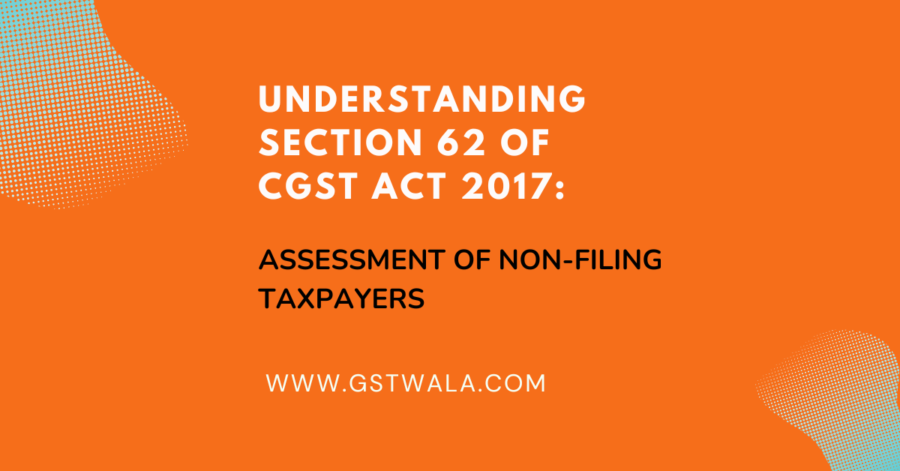
Understanding Section 62 of CGST Act 2017: Assessment of Non-Filing Taxpayers
Within the realm of GST compliance, an in-depth understanding of Section 62 of the Central Goods and Services Tax (CGST) Act 2017 is indispensable, especially for businesses navigating the complexities of the GST framework. This section is dedicated to elucidating the assessment procedures pertinent to registered taxpayers who fail to fulfill their obligation of filing GST returns within the designated deadlines. Now, let us embark on a detailed exploration of the fundamental components encapsulated within this section to grasp its significance more comprehensively:
Top of Form
What Does Section 62 Entail?
- Failure to Submit GST Returns: Section 62 outlines the repercussions for registered taxpayers who fail to furnish their GST returns as required under Section 39 or Section 45, despite being served a notice under Section 46. This failure can trigger an assessment process.
- Assessment Conducted by Proper Officer: According to Section 62, the proper officer is empowered to conduct an assessment of the tax liability of the taxpayer if they have not filed their returns within the specified timeframe. This assessment can be conducted within five years from the due date prescribed under Section 44 for filing the annual return. The assessment is based on the available material at the disposal of the officer.
- Issuance of Assessment Order: Following the assessment process, the proper officer issues an assessment order within the stipulated timeframe. This order takes into account all relevant records and serves as an official document detailing the assessed tax liability.
- Withdrawal of Assessment Order: In the event that the registered taxpayer submits a valid return within thirty days of receiving the assessment order, Section 62 allows for the withdrawal of the assessment order. However, it’s crucial to note that the taxpayer remains liable for any accrued interest and penalties, notwithstanding the withdrawal of the assessment order.
Top of Form
- .
Remedy Available to GST Taxpayer:
- Furnishing GST Return within 15 Days: If the registered taxpayer furnishes the GST return within fifteen days from the issue of notice under Form GST-3A as per Section 46, assessment proceedings are dropped.
- Furnishing Valid Return within 30 Days: Furnishing a valid return within thirty days from the date of service of the assessment order under Section 62(1) results in dropping the proceedings.
Interest and Penalty:
Interest and penalty are levied as per law due to non-furnishing of GST returns and non-payment of tax liability.
Timelines to Issue Order:
The assessment order must be issued within five years from the date of furnishing the annual return under Section 44 of the CGST Act 2017.
Assessment of Tax Liability:
Tax liability is assessed based on various sources, including details of outward supplies, inward supplies, e-way bills, and inspection reports.
Types of Returns Under Section 39 and Section 45:
Different types of returns cater to various taxpayer categories, ensuring compliance with GST regulations.
Department Circulars and Notifications:
The GST department has issued guidelines for non-filers of returns, emphasizing timely compliance through notices and assessments.
Having a comprehensive grasp of Section 62 within the Central Goods and Services Tax (CGST) Act is of utmost importance for taxpayers, enabling them to effectively navigate the intricate landscape of GST compliance. This particular section delineates crucial provisions pertaining to filing deadlines and the prompt response to notices issued by tax authorities. Adherence to these deadlines and timely resolution of notices are instrumental in averting the commencement of assessment proceedings and the consequent imposition of penalties.
To attain a deep understanding of the ramifications of Section 62 and its relevance in the realm of GST compliance, it is strongly advised to delve into the pertinent laws and regulations governing the GST framework. By immersing themselves in these resources, taxpayers can glean detailed insights that facilitate adherence to statutory requirements, thus mitigating the risks of non-compliance and the associated penalties. Such proactive measures ensure a smooth and compliant journey within the GST regime, safeguarding businesses from potential pitfalls.
Stay ahead of the curve with gstwala.com; Together, let’s simplify GST for a smoother business journey.
We are just a click away info@gstwala.comTop of Form
Top of Form
